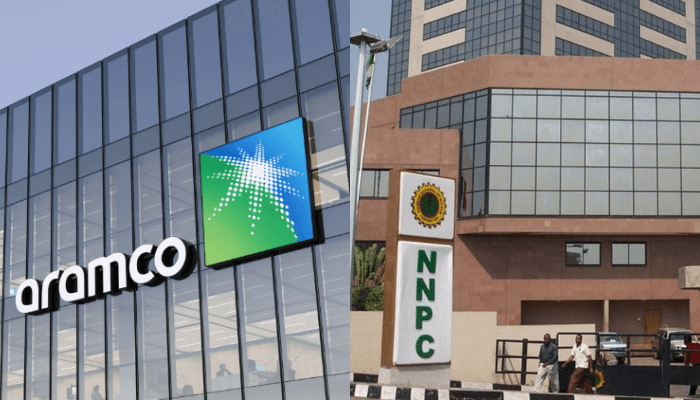Aramco’s $21bn dividend puts NNPC under spotlight
Saudi Aramco’s latest financial results have reinforced the company’s reputation as the world’s most profitable national oil corporation, while at the same time placing Nigeria’s Nigerian National Petroleum Company (NNPC) Limited under renewed scrutiny.
Aramco announced a dividend payout of more than $21 billion after posting a robust third-quarter profit of $28 billion, a stark comparison to NNPC’s failure to remit a single dividend to Nigeria’s treasury through the first eight months of 2025, despite earning over N1.06 trillion from oil production-sharing revenues within the same period.
Experts say the contrast has implications that reach beyond the financial performance of the two firms. It reflects the different roles national oil companies play in their respective economies and exposes the consequences of what critics describe as limited transparency and weak accountability at NNPC.
For a Nigerian government struggling with revenue shortages and rising borrowing costs, NNPC’s refusal, or inability, to remit projected dividends of more than N2.16 trillion is becoming a structural fiscal headache.
Read also: Nigeria, Saudi Aramco struggle to finalise $5bn oil-backed loan on crude price slump
Aramco delivers profits
Saudi Aramco’s third-quarter (Q3) earnings show a company operating on a different plane from its global peers. It booked net earnings of $28 billion, benefiting from an increase in crude production after OPEC+ gradually unwound voluntary production cuts and from improved international prices. The company reported free cash flow of $23.6 billion and cash flow from operating activities of $36.1 billion.
Aramco’s average realised crude price rose to $70.10 per barrel during the quarter, compared to $66.70 in the previous quarter. Prices remained lower on a year-on-year basis, but the company compensated by increasing output.
Amin Nasser, chief executive of Aramco, highlighted Aramco’s ability to scale production ‘with minimal incremental cost,’ a characteristic that allows it to remain profitable even in downturns.
But the standout figure from the results was the dividend payout: a base dividend of $21.1 billion, plus a $200 million performance bonus.
For Saudi Arabia, Aramco’s dividends are not merely corporate disbursements; they are an extension of the government’s fiscal toolkit. These payments are essential to financing Vision 2030, the nation’s economic diversification programme, and they enable the kingdom to avoid excessive public borrowing.
While delivering dividends, Aramco is accelerating its investment programme. It has raised its gas production growth target to 80 percent by 2030 from 2021 levels, revised upward from the previous 60 percent goal.
The company’s marquee gas project, the Jafurah shale field, contains an estimated 229 trillion cubic feet of gas and 75 billion barrels of condensate and is positioned to become one of the largest unconventional gas operations outside the United States. Just weeks ago, Aramco signed an $11 billion infrastructure lease deal with Global Infrastructure Partners, monetising assets without relinquishing operational control.
In essence, Aramco is simultaneously paying record dividends and investing heavily in the future of Saudi energy.
Read also: Aramco considering asset sales to raise cash; Is NNPC aware?
NNPC records billions in revenue but remits nothing
In Nigeria, NNPC Limited disclosed in its August 2025 FAAC report that it earned N1.06 trillion from production sharing contract (PSC) profit oil between January and August. PSC profit oil refers to the portion of crude production that remains after oil companies recover their costs – the balance is then shared with the NNPC and ultimately the federation.
The revenue data shows monthly inflows that fluctuate sharply: N105.91 billion in January, N127.66 billion in February, and N204.96 billion in March. After a temporary decline to just N22.77 billion in June, revenues surged to N263.13 billion in August, the highest in the year to date.
Yet, alongside these revenue figures, the FAAC document includes a separate line titled ‘NNPC Ltd Calendarised Interim Dividend to Federation Account.’
The entry remains blank for every month. The company was expected to remit N2.168 trillion to the federation account during the eight months, but instead remitted nothing.
“You don’t spend billions exploring oil we don’t know exists, while refusing to remit dividends from oil that already exists,” said Aisha Mohammed, an energy analyst at the Lagos-based Centre for Development Studies.
The FAAC report shows that NNPC split the N1.06 trillion earned from PSC profit oil into three internal allocations: 30 percent as an NNPC management fee; 30 percent to the Frontier Exploration Fund, and 40 percent as the federation share.
In practice, the company retained N318.05 billion as management fees, transferred an equal amount to the Frontier Exploration Fund, and passed N424.07 billion to the federation. The funds allocated to frontier exploration are used to search for oil in prospective basins such as Sokoto, Benue, and Chad – areas where no commercial discoveries have yet been declared.
Meanwhile, the budget expectations tell a different story. Against a revenue projection of N1.58 trillion for PSC earnings, NNPC’s actual collections fell short by more than N518 billion. But the shortfall in PSC revenue pales in comparison to the missing dividend line: a deficit of N2.169 trillion.
Mohammed said, “NNPC wants to behave like a private company when reporting revenue, but like a government agency when spending money.”
Agora Policy, an Abuja-based public policy think tank that reviewed the FAAC document, warned that the situation is undermining the country’s fiscal stability. According to the organisation, NNPC has achieved only 15 percent of its projected revenue target to the federation, even though it has delivered 67 percent of the profit oil due to the government.
The transformation of NNPC into a limited liability company under the Petroleum Industry Act (PIA) was intended to create a commercially viable entity comparable to Petrobras or Aramco. Instead, NNPC still operates as a revenue gatekeeper, collecting earnings and distributing them through internal mechanisms that lack public visibility.

